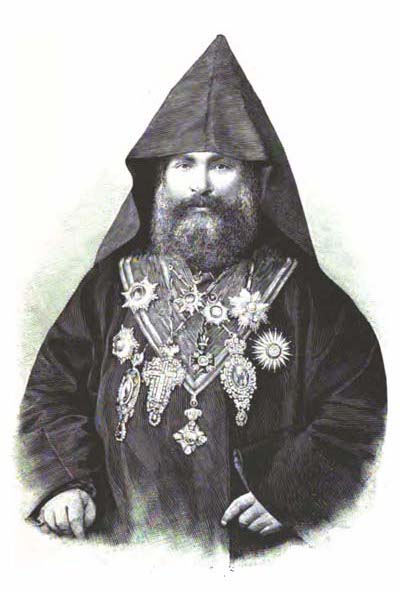Birth of Archbishop Khoren Kalfayan (September 6, 1831)

Archbishop Khoren Kalfayan, also know by the literary surname of Nar Bey, was a well-known literary and public figure in the second half of the nineteenth century.
He was born in Constantinople on September 6, 1831. Along with his brother Ambrosius Kalfayan, he was sent to the convent of St. Lazarus of the Mekhitarist Congregation of Venice, where he received his education.
He taught at the Samuel-Moorat School of the Mekhitarists in Paris. In 1855-1858 he edited the monthly “Masiats Aghavni” with Archbishop Kapriel Ayvazovski (brother of the famous painter). Ayvazovski, the Kalfayan brothers and Very Rev. Fr. Sarkis Teodorian renounced Catholicism and quit the Mekhitarist Congregation in 1856 and joined o the Armenian Apostolic Church. Khoren Kalfayan became the principal of the Haigazian School in Paris (1857-1859). He had made the acquaintance of Alphonse de Lamartine, the famous French poet, and translated his poems into Classical Armenian in 1859.
After the Haigazian School was closed, he returned to Constantinople and then left for Feodosia, in Crimea, where he taught at the Khalibian School and participated in the publication of Masiats Aghavni, which had been moved from Paris. He published three collections of verse: Rose Tree (1863), The Emigrant’s Lyre (1868), and Armenian Shadows (1874). His brother and him claimed to descend from the Lusignan family, which had briefly ruled in the Armenian kingdom of Cilicia in the fourteenth century, but their claims were not proven, even though they adopted the surname Lusignan.
He and was consecrated bishop in 1867 at Holy Etchmiadzin. He then moved to Constantinople and was elevated to the rank of archbishop in 1873. He accompanied Khrimian Hayrig to the Congress of Berlin (1878) and performed valuable service for him as a translator. He also undertook an ecclesiastical diplomatic mission to St Petersburg.
Archbishop Kalfayan’s political activities made him suspect in the eyes of Sultan Abdul Hamid II. Despite his efforts to quell such suspicions, it was proven that he was in contact with French political figures and provided them with confidential information. On November 4, 1892, he was called to the police department by orders of Abdul Hamid and killed with poisoned coffee.
